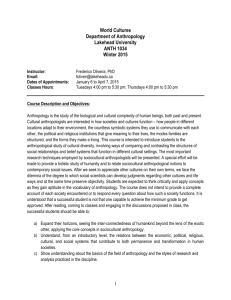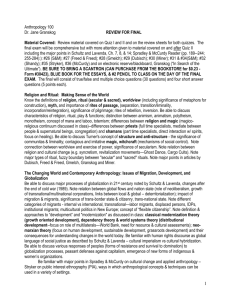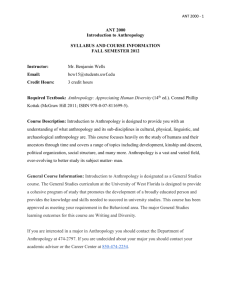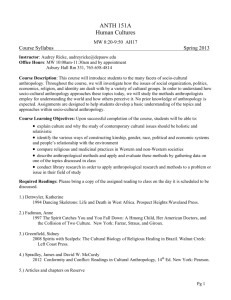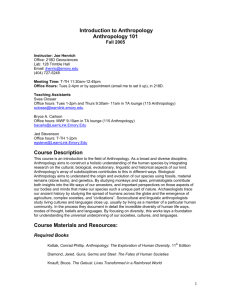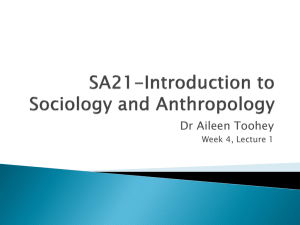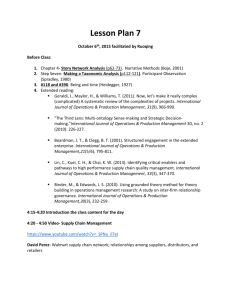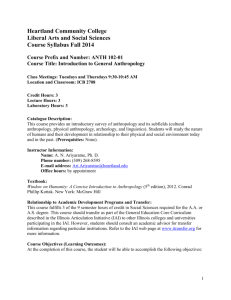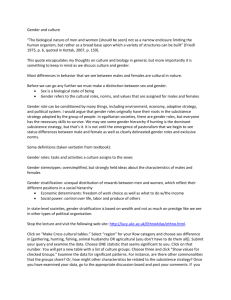lnstructor: Hours: and Introduction to Social
advertisement
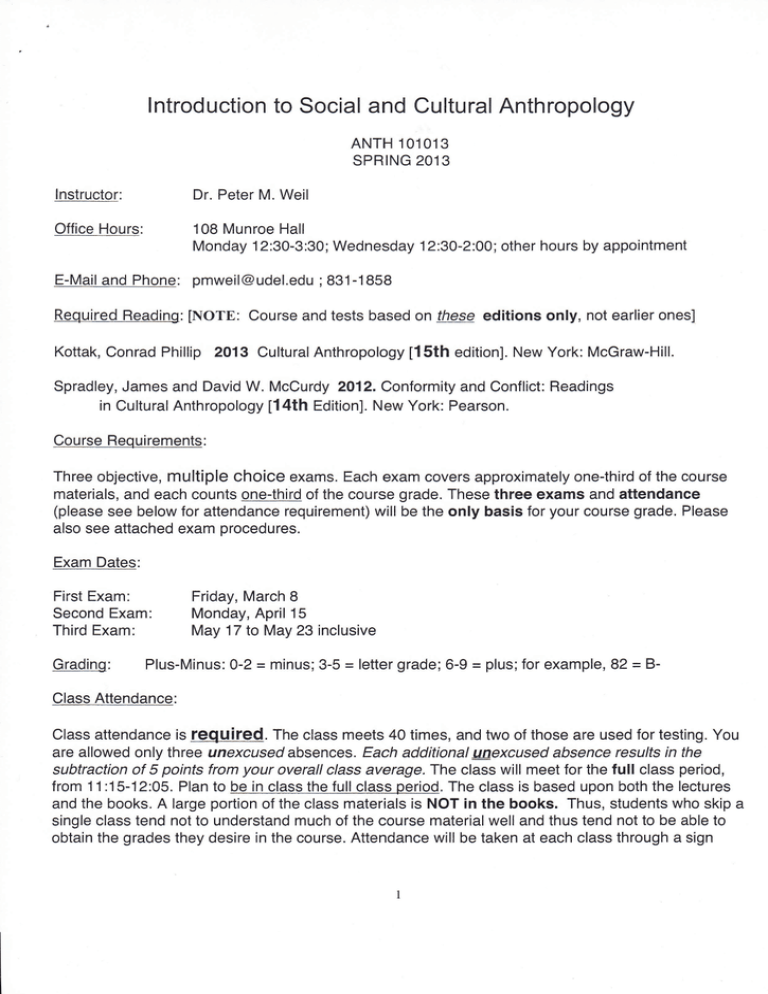
Introduction to Social and Cultural Anthropology
ANTH 101013
SPRING 2013
lnstructor:
Office
Hours:
Dr, Peter M, Weil
108 Munroe Hall
Monday 12:30-3:30; Wednesday 12:30-2:00; other hours by appointment
E-Mail and Phone: pmweil@udel.edu ; 831-1858
Required Reading: [NOTE: Course and tests based on these editions only, not earlier ones]
Kottak, Conrad
Phillip 2013 Cultural Anthropology [1Sth edition].
New York: McGraw-Hill.
Spradley, James and David W. McCurdy 2012. Conformity and Conflict: Readings
in Cultural Anthropology [14th Edition]. New York: Pearson.
Course Requirements:
Three objective, multiple choice exams. Each exam covers approximately one{hird of the course
materials, and each counts one-third of the course grade. These three exams and attendance
(please see below for attendance requirement) will be the only basis for your course grade. Please
also see attached exam procedures,
Exam Dates:
Exam:
Exam:
Exam:
First
Second
Third
Grading:
I
Friday, March
Monday, April 15
May 17 to May 23 inclusive
Plus-Minus: 0-2
-
minus; 3-5 = letter grade; 6-9 = plus; for example, 82 = B-
Class Attendance:
Class attendance is required. The class meets 40 times, and two of those are used for testing. You
are allowed only three unexcused absences. Each additional unexcused absence results in the
subtraction of 5 points from your overall class average. The class will meet for the full class period,
from 1 1 :15-1 2:05. Plan to be in class the full class period. The class is based upon both the lectures
and the books. A large portion of the class materials is NOT in the books. Thus, students who skip a
single class tend not to understand much of the course material well and thus tend not to be able to
obtain the grades they desire in the course. Attendance will be taken at each class through a sign
sheet and your own signature is lhe only basis for checking your attendance. {Please also see test
attendance policy in course outline below)
Helpful Heminder: Classes, exams, and grades for this course are governed by University policies
described in the current Student Guide to Policies. For additional discussion of these and related
Anthropology Department policies, see attached sheet.
E-Mail for
Students:
E-mail messages concerning the course may be sent to class members'
UD email address at any time, and students are responsible for knowing the
information in them.
Study Suggestions:
1.
Each multiple-choice exam will cover both class and book material. You are expected to know
ALLmaterials from classes and assigned reading. Moreover, you are
expected to demonstrate your understanding by effectively applying COnCeptS on
exams.
and understand
2.
Attend class. There are only 40 lecture classes and a single absence constitutes an important
portion of the course. Moreover, notes that are effective are personal for you. ln class, take
your own notes and use them in reviewing all lecture material. For most, this means making
outline notes that are fairly detailed. Class notes for the next exam should be reviewed by you
at least once every week to help you better understand the meaning of daily material in the
context of the course as a whole and to identify areas that you do not understand adequately.
Then you should ask the instructor to help you understand the problem areas.
3.
Treat audio-visual materials as being of the same importance as lectures and assigned
reading. For example, take notes on them.
4.
Read assigned chapters in both texts before the class at which they or material related to them
are discussed. Each class is presented with the assumption that you have read the assigned
material before the lecture,
5.
After you have read each assigned chapter in Kottak, use the "Summdr!" , "Key Terms", "Test
Yourself" features at the end of each. ln addition, you may find the "Glossary" at the end of the
book helpful in reviewing relevant concepts in the chapter. The same sections can be used rn
combination with your class notes to assist yourself in preparing for the exams.
6.
Do ask the instructor to clarify lectures or materials you have read.
COURSE OUTLINE
What ls Anthropology? 214-2/6
Kottak
Read:
Spradley and
il.
Culture as a
Read:
1il.
Kottak
Spradley and
lv.
----)
McCurdy
FIRST
1
,3, 4,36,37, and 39
5, 6, 8, 29, and 31
2120-2122
6 and 9 fpp.207-217 and 222-226 onlyl
McCurdy Pp. 185-188; Ch's 22, 24, and 35
Ch's
Technology: Cultural Adaptive
Read:
Pp. 2-5; Ch's
Trobriand Cricket
Biology and Culture
Read:
McCurdy
Process 218-2118
Kottak Ch's 2 and 5
Spradley and
Film:
Ch's 1 and 3
Strategies
2125-3lo
Kottak
Ch's 7 [pp.153-1 67;9 [pp. 217-2291
Spradley and McCurdy Pp.70-72; Ch's 10, 1 1 , and 12
EXAM<--- Friday, MARCH 8
gXttgfilg
Exam Make-Up Policy: This policy applies to ail three exams. Only
circumstances,
such as the death of a close family member or a medically-certified student illness, will be
accepted as justification for missing an exam and being allowed to take a make-up exam.
Requests to the instructor for permission to take a make-up exam must be accompanied by
justification in writing from an authority other than the student. The justification must be in
hard copy. signed and dated by the authority and include the authority's telephone
number. A missed scheduled exam that is not made up is graded as azero.
V.
Social Organization: Economic
Processes
3111-3120
Read: Kottak
Ch Z [pp. 168-179]
Spradley and McCurdy Pp. 1 15-1 1B; Ch's 2, 13, and 25
David Counts 1990 "Too Many Bananas, Not Enough Pineapples, and No
Watermelon at
See:
http ://anth ropology. uwaterloo.caAff NB/TooManyBananas. htm
All"
Flilm
=
A Poor Man Shames Us All
NOTE,
No classes s/25-st2s SpRtNG BREAK
==
==
=
==
Vl.
=
==
=
=
===== = === =
Social Organization:
Marr.iage
Read: Kottak
Spradley and
VIl.
Ch
OIZZ-411
11
McCurdy
Pp. 151 -154; Ch's 20 and 23
Social Organization and Technologv: Kinship and Family Organization
4/3-4t8
Read: Kottak
Spradley and
Vlll. Social Organization:
McCurdy
Bands and
Read: Kottak
Spradley and
Ch
Tribes
Ch 10
Ch's 17 and 18
4t1O-4112
I [pp. 184192)
McCurdy
Ch's 9 and 26
----)SECOND EXA[{q---- MONDAY, APRIL
lX.
Social Organization: Chiefdoms and Non-lndustrial
Read: Kottak
Spradley and
Film:
The lncas
McCurdy
Ch
27
I
States
[pp. 192-2OS)
1S
4117-4127
I
X.
Social Organization: :The lndustrial State and Globalization
4t29-5t6
Read: Kottak
Spradley and
Xl.
ldeology:
14, 15, 4 and I [pp. 218-222 only]
Pp.294-295; Ch's 15, 16, 32, and 33
McOurdy
Religion 5/8-5/13
Read:
Kottak
Spradley and
Film:
Ch
Ch 12
McCurdy Ch's 28 and 30
Cows of Dolo Kem Paye
----->THIRD 60-minute EXAM<rrr--r
At some point in the MAY 16 to May 23 period; nO
air or other tickets are accepted as excuse for
missing
GEI\ERAL STATEMENIT OF POLICIES AND PROCEDURES
FOR STUDENTS TN AI{THROPOLOGY
The University of Delaware's Board of Trustees, Administration, Faculty and Students have together developed a set o
policies and procedures governing the rights and responsibiiities of those engaged in the education process. Certain of
GUID
policies and procedures apply to the conduct of ciasses and are cleariy explained in the annual
UNIVERSITY POLICIES prepared by the Office of Campus Life. It is a responsibility of both students and facuity
they be knowledgeable about the content of this document which can be accessed at http://www
l3/code.html . Students in anthropology classes will be held responsible for understanding and adhering to the Statement o
Academic Policy.
Piagiarism and other forms of cheating will be handled through the Universiry's judicial process. (For a statement describ
plagiarism and other academic violations please use web address provided in the previous paragraph.) Ifyou have doubt
about correct practice, you should seek the advice of your instructor before completing assignments. For those anthropol
courses that require written, out of class papers, the Department strongly advises, and in some courses may require, the use o
A Manual for Writers of Term Papers. Theses, and Dissertations, Seventh Edition, by Kate L. Turabian. It is available in t
University Bookstore.
The
with t
ent of Ant
w
the same. It is
sitrilitv to familiarize vourself with t
Code of Conduct.
As a Department we are especially concerned that students be aware of their rights as well as their responsibilities. Since
expect to hoid you to your responsibilities we expect to be held to ours. As members of a faculty and as anthropologists
have both an institutional and discipiinary commitment to just and equitable regard for human differences; differences o
gender, race, ethnicify, religion, age, physical condition and sexual orientation. Humor or disparagement directed
individuals or groups merely by virtue of their inclusion in such a category is unacceptabie. Where patterns of such humor o
disparagement are rccognized, they should be called to the attention of the faculty member or to the Department Chairperso
(Dr. Karen Rosenberg, 135 Munroe Hall, krr@udel.edu ). Ali communication with the Chairperson will be held in stri
confidence.
While policies regarding disruptive behavior are clearly presented in the STUDENT GUIDE,
regarding courtesy are less clear. Courtesy is essential to the unrestricted flow of information and
regard it as a responsibility owed to all parties in the education process: student to teacher, teacher
student, and student to student. Private conversations carried on during class are both discourteous
disruptive, as are early and unannounced exits from class. While individual faculty may establi
attendance policies for classes, students are expected to remain in classes they attend unless they
taken ill during class or have indicated at the beginning of class that they will need to leave earl
Students who have reason to exit early should find seats as close to the exit as possible.
0Ut4t201
